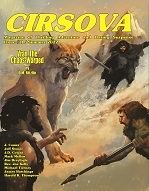“Vran, the Chaos-Warped” by D.M. Ritzlin (serial, not reviewed)
“Orphan of the Shadowy Moons” by Michael Tierney (serial, not reviewed)
“Death and Renewal” by Jim Breyfogle
“What Price the Stars” by Jeff Stoner
“Dead Planet Drifter” by J.D. Cowan
“People of the Stone God” by Harold R. Thompson
“The Last Khazar” by Rev. Joe Kelly
“Melkart and the Crocodile God” by Mark Mellon
Reviewed by Victoria Silverwolf
In addition to fiction and the latest installment of a serialized narrative poem, this issue features a new book review column.
“Death and Renewal” by Jim Breyfogle is the latest in a series of sword-and-sorcery yarns about a pair of adventurers. In this tale, their assignment is to prevent a slave from revealing what he knows about his former owner to his new master. A temporary magic spell keeps the slave from speaking, but it will wear off soon. A further complication is that the slave must not be killed, lest his owner exact a terrible revenge. The male member of the pair must humiliate the slave, a mighty gladiator, in battle without slaying him. Meanwhile, the female member uses her feminine wiles on the slave’s owner.
I have supplied a fairly long synopsis because this story is very cleverly plotted. The male adventurer isn’t fully aware of what his partner has in mind, adding to the suspense and mixing in a subtle touch of wit. There is even a bit of satire, I believe, in a scene of a fashion show that parodies the excesses of such events in the modern world. I have read a fair number of the stories in this series, and I think this one is the best.
In “What Price the Stars” by Jeff Stoner, a mysterious man offers to demonstrate faster-than-light travel to a group of business tycoons. Whichever one wins the right to profit from the technology must promise to serve as the man’s slave, and have all his or her descendants act in that capacity as well. What follows is a complex odyssey involving a secret church, dead aliens, soul transfer, and many other things.
I have kept this synopsis short and vague because the plot throws in everything but the kitchen sink. I certainly cannot fault the author for lack of imagination, but some readers may find this too wild of a roller coaster ride to fully enjoy. Although the story seems, at first, to be pure science fiction, it throws in major fantasy concepts as it continues. At times, this juxtaposition is less than graceful. The true identity of the strange man is never explicitly stated, but it seems obvious from what follows. Many will guess it from early clues in the text.
The hero of “Dead Planet Drifter” by J.D. Cowan is an interplanetary law enforcement agent. He arrives on a world with holes in his memory. The voice of a woman from his past, whom he cannot quite recall, guides him as he escapes from imprisonment and battles supernatural enemies.
This mixture of science fiction and fantasy has a confusing plot, partly due to the protagonist’s faulty memory but also because it opens with a scene that jumbles together past and present in a bewildering way. Despite the futuristic trappings, it is essentially a violent adventure in an imaginary setting.
“People of the Stone God” by Harold R. Thompson takes place in a fantasy world resembling the late nineteenth or early twentieth century. The protagonist, a secret agent of sorts, undertakes a mission to return a religious artifact of great power to a people who are under the rule of conquerors, in an effort to help them overcome their oppressors. Use of the item has unexpected consequences.
The story’s semi-Victorian mood, unusual for this kind of fantasy adventure, adds interest to the plot. We are told what the artifact will do early in the story, so what happens is only slightly surprising.
“The Last Khazar” by Rev. Joe Kelly takes place in Nazi-occupied Poland. A Jew and a German officer share recurring dreams of their former lives as enemies in the distant past. The arrogant Nazi expects to defeat the Jew in the present, as he did in the past. The Jew struggles to overcome his foe in both worlds.
The author obviously did a great deal of research, creating two different historical settings of great verisimilitude. Like other stories in the magazine, this one features violent battles. In this case, however, they are not merely escapist entertainment, and instead carry great emotional weight.
The setting for “Melkart and the Crocodile God” by Mark Mellon is a fantasy version of ancient Africa, in the region south of Egypt. The hero travels to this land on a trade journey. A monstrous being, part giant man and part crocodile, bursts out of the ground. It has the power to control people with its gaze. It sets itself up as a tyrant, even devouring its subjects. The protagonist must use all his strength and wits to defeat the godlike creature.
The way in which the hero protects himself from the monster’s gaze will remind readers of a familiar myth. The exotic setting is interesting, but the plot is a standard one from the genre of sword-and-sorcery, in which a mighty warrior battles a powerful, evil creature.
Victoria Silverwolf has to come in early to work Monday.
 Cirsova
Cirsova